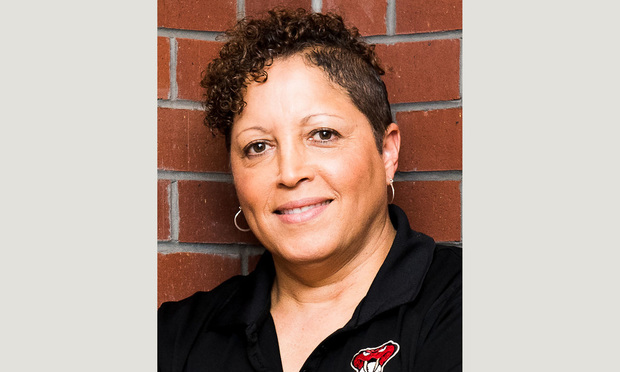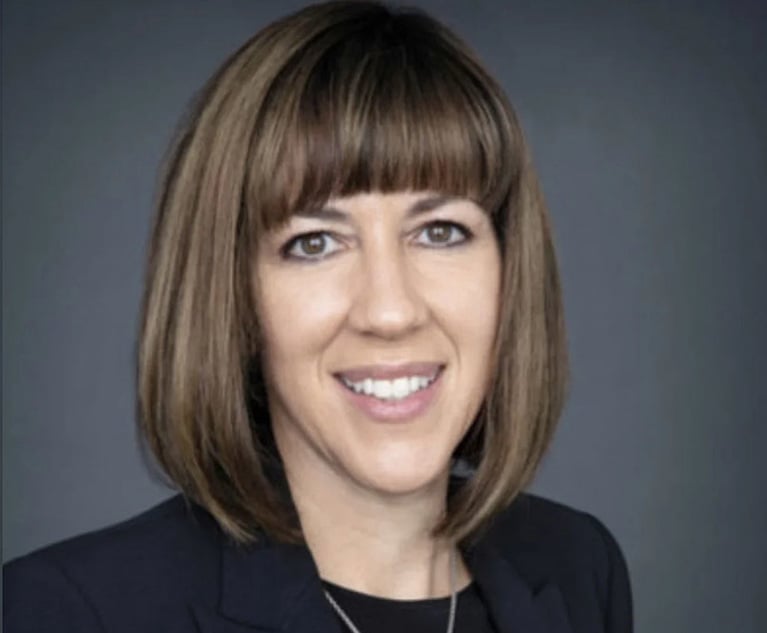Chief Legal Officer Nona Lee Hit a Home Run With Arizona Diamondbacks
Corporate Counsel recently spoke with Lee, who just ended her term as president of the Sports Lawyers Association, about her 20-year in-house career with the Diamondbacks and the obstacles she faced as an openly gay, African American woman.
December 09, 2019 at 05:41 PM
7 minute read
 Nona Lee, general counsel of the Arizona Diamondbacks. Photo: Sarah Sachs/Arizona Diamondbacks
Nona Lee, general counsel of the Arizona Diamondbacks. Photo: Sarah Sachs/Arizona Diamondbacks
Nona Lee, chief legal officer and executive vice president of Major League Baseball's Arizona Diamondbacks, describes herself as a one-time reluctant lawyer.
But once the former college athlete discovered that she could combine her legal knowledge with her passion for sports, she knew she had found her calling.
Corporate Counsel recently spoke with Lee, who just ended her term as president of the national Sports Lawyers Association, about her 20-year in-house career with the Diamondbacks and the obstacles she faced as an openly gay, African American woman. Here are excerpts from that conversation, edited for clarity and brevity:
Corporate Counsel: How and why did you decide on a career in law?
Nona Lee: Growing up in Los Angeles, my mother was a legal secretary, and I spent a lot of summers working in law firms. I was intrigued with the law, but I did not like lawyers. That was part of my reluctance to become one.
I was working in the business side of the entertainment industry and knew that was not for me. So I decided to try being a paralegal, to see if I would like it. I worked for a sole practitioner who kept bugging me about going to law school. It took me nine years but finally I did.
After law school, I went to work as a litigator with a major firm in Phoenix, [then] Meyer, Hendricks, Victor, Osborn & Maledon.
CC: Please describe your legal department, such as how many attorneys you have and how is it structured.
NL: It's a relatively small team of six people, including three attorneys. The general counsel and one paralegal and my assistant report to me. An associate general counsel and an intern report to the general counsel.
CC: How did you end up in sports law as an in-house counsel?
NL: I was always an athlete. I was a collegiate basketball player at Pepperdine, and a water polo player and an AAU [Amateur Athletic Union] swimmer. Sports is a huge passion for me and how I relate to the world.
As a litigator I had no idea there were opportunities to practice in sports. Then the WNBA [Women's National Basketball Association] started, and I became obsessed with how to merge my practice with my passion.
A woman [and former law firm colleague] I knew was general counsel of the [professional basketball team] Phoenix Suns. I called her and said how do I do what you do. She said you are unqualified because you need to be a transactional lawyer to work in-house and you are a litigator.
Then I and a woman partner asked [law firm founder] Ed Hendricks if we could start a sports law practice. He said no. So I researched other law firms in town and landed interviews with two firms that worked with sports teams.
One of them, Gallagher & Kennedy, was outside counsel for the Arizona Diamondbacks, and they made me an offer, which I accepted, to start over as a transaction attorney in their firm.
About a week later they said my friend who was general counsel for the Suns was leaving, and would I like to interview for that spot. Even though she had told me I was not qualified, I went through the interview process. I didn't get the job.
But within two months after I started at Gallagher & Kennedy, the Suns, whose owner also owned the Diamondbacks, created a No. 2 position of associate general counsel and offered it to me.
I walked into that arena and just knew I was home. I knew that was my path and the stars had aligned.
CC: To what do you attribute your success?
NL: A few things—preparation meets opportunity, hard work, willingness to take risks, guidance and support from people I respect, and the amazing legal team I work with here.
CC: What is the biggest legal challenge you have faced?
NL: We had a dispute a couple years ago with the Maricopa County Stadium District, which is the owner of Chase Field where our stadium is. We finally came out on the other side, but it was really tough to be in dispute with your landlord.
CC: What do you see as your challenges in the future?
NL: The biggest challenge is that the business of sports is constantly changing. We are assessing what we are going to do about our stadium needs going forward.
And we are watching gaming, and how it will affect professional sports. The way that fans consume sports content is so different now, and it's like a moving target to stay on top of it or get ahead of it.
Also, in my mind, you are always worried about fan safety and stadium security in this sometimes dangerous world. A large sports facility is a little different than a lot of businesses.
CC: How has being an openly gay woman impacted your legal career, if at all?
NL: I try my best to be authentic. I have found the more comfortable I have been with myself, the more comfortable others are with me. I would say it has enhanced my career, given me an opportunity to be an advocate.
I have spearheaded a Diamondbacks woman group here, because we're not where we should be in the industry. I have an opportunity to see that industry is more fair and kinder to others, and to help women step into their power. We can't make them promote us, but we can make sure we are ready.
CC: What's it like working in a male-dominated area?
NL: I suit up, I show up. I sit at the table and do my job. I speak up. I have an obligation to do that. Yes, sports is male-dominated, but I don't think sexism is unique to sports. I found law firms far more sexist and uncomfortable.
Women are still behind the curve, but I've seen it change so much over the years, and I think it will continue to do so with more women in leadership.
CC: What are the main perks of your job?
NL: Well, the biggest one is working in an industry that I love, every day for 20 years. Of course, I get to go to the games, and I have a World Series ring. I travel a fair amount, especially to the Dominican Republic where all 30 baseball clubs have academies.
CC: What advice would you give to a law student or young lawyer who is interested in becoming a general counsel?
NL: I'd say to learn business in general, then learn the business you are planning on going into. It's hard to be a good general counsel if you don't have an understanding of all aspects of the business you are working for. I underestimated that, and I think most lawyers do.
This content has been archived. It is available through our partners, LexisNexis® and Bloomberg Law.
To view this content, please continue to their sites.
Not a Lexis Subscriber?
Subscribe Now
Not a Bloomberg Law Subscriber?
Subscribe Now
NOT FOR REPRINT
© 2025 ALM Global, LLC, All Rights Reserved. Request academic re-use from www.copyright.com. All other uses, submit a request to [email protected]. For more information visit Asset & Logo Licensing.
You Might Like
View All

Spotify GC Steps Down, Opts to 'Step Away From Full-Time Corporate Life'
2 minute read
Netflix Music Guru Becomes First GC of Startup Helping Independent Artists Monetize Catalogs
2 minute readTrending Stories
- 1Gunderson Dettmer Opens Atlanta Office With 3 Partners From Morris Manning
- 2Decision of the Day: Court Holds Accident with Post Driver Was 'Bizarre Occurrence,' Dismisses Action Brought Under Labor Law §240
- 3Judge Recommends Disbarment for Attorney Who Plotted to Hack Judge's Email, Phone
- 4Two Wilkinson Stekloff Associates Among Victims of DC Plane Crash
- 5Two More Victims Alleged in New Sean Combs Sex Trafficking Indictment
Who Got The Work
J. Brugh Lower of Gibbons has entered an appearance for industrial equipment supplier Devco Corporation in a pending trademark infringement lawsuit. The suit, accusing the defendant of selling knock-off Graco products, was filed Dec. 18 in New Jersey District Court by Rivkin Radler on behalf of Graco Inc. and Graco Minnesota. The case, assigned to U.S. District Judge Zahid N. Quraishi, is 3:24-cv-11294, Graco Inc. et al v. Devco Corporation.
Who Got The Work
Rebecca Maller-Stein and Kent A. Yalowitz of Arnold & Porter Kaye Scholer have entered their appearances for Hanaco Venture Capital and its executives, Lior Prosor and David Frankel, in a pending securities lawsuit. The action, filed on Dec. 24 in New York Southern District Court by Zell, Aron & Co. on behalf of Goldeneye Advisors, accuses the defendants of negligently and fraudulently managing the plaintiff's $1 million investment. The case, assigned to U.S. District Judge Vernon S. Broderick, is 1:24-cv-09918, Goldeneye Advisors, LLC v. Hanaco Venture Capital, Ltd. et al.
Who Got The Work
Attorneys from A&O Shearman has stepped in as defense counsel for Toronto-Dominion Bank and other defendants in a pending securities class action. The suit, filed Dec. 11 in New York Southern District Court by Bleichmar Fonti & Auld, accuses the defendants of concealing the bank's 'pervasive' deficiencies in regards to its compliance with the Bank Secrecy Act and the quality of its anti-money laundering controls. The case, assigned to U.S. District Judge Arun Subramanian, is 1:24-cv-09445, Gonzalez v. The Toronto-Dominion Bank et al.
Who Got The Work
Crown Castle International, a Pennsylvania company providing shared communications infrastructure, has turned to Luke D. Wolf of Gordon Rees Scully Mansukhani to fend off a pending breach-of-contract lawsuit. The court action, filed Nov. 25 in Michigan Eastern District Court by Hooper Hathaway PC on behalf of The Town Residences LLC, accuses Crown Castle of failing to transfer approximately $30,000 in utility payments from T-Mobile in breach of a roof-top lease and assignment agreement. The case, assigned to U.S. District Judge Susan K. Declercq, is 2:24-cv-13131, The Town Residences LLC v. T-Mobile US, Inc. et al.
Who Got The Work
Wilfred P. Coronato and Daniel M. Schwartz of McCarter & English have stepped in as defense counsel to Electrolux Home Products Inc. in a pending product liability lawsuit. The court action, filed Nov. 26 in New York Eastern District Court by Poulos Lopiccolo PC and Nagel Rice LLP on behalf of David Stern, alleges that the defendant's refrigerators’ drawers and shelving repeatedly break and fall apart within months after purchase. The case, assigned to U.S. District Judge Joan M. Azrack, is 2:24-cv-08204, Stern v. Electrolux Home Products, Inc.
Featured Firms
Law Offices of Gary Martin Hays & Associates, P.C.
(470) 294-1674
Law Offices of Mark E. Salomone
(857) 444-6468
Smith & Hassler
(713) 739-1250







